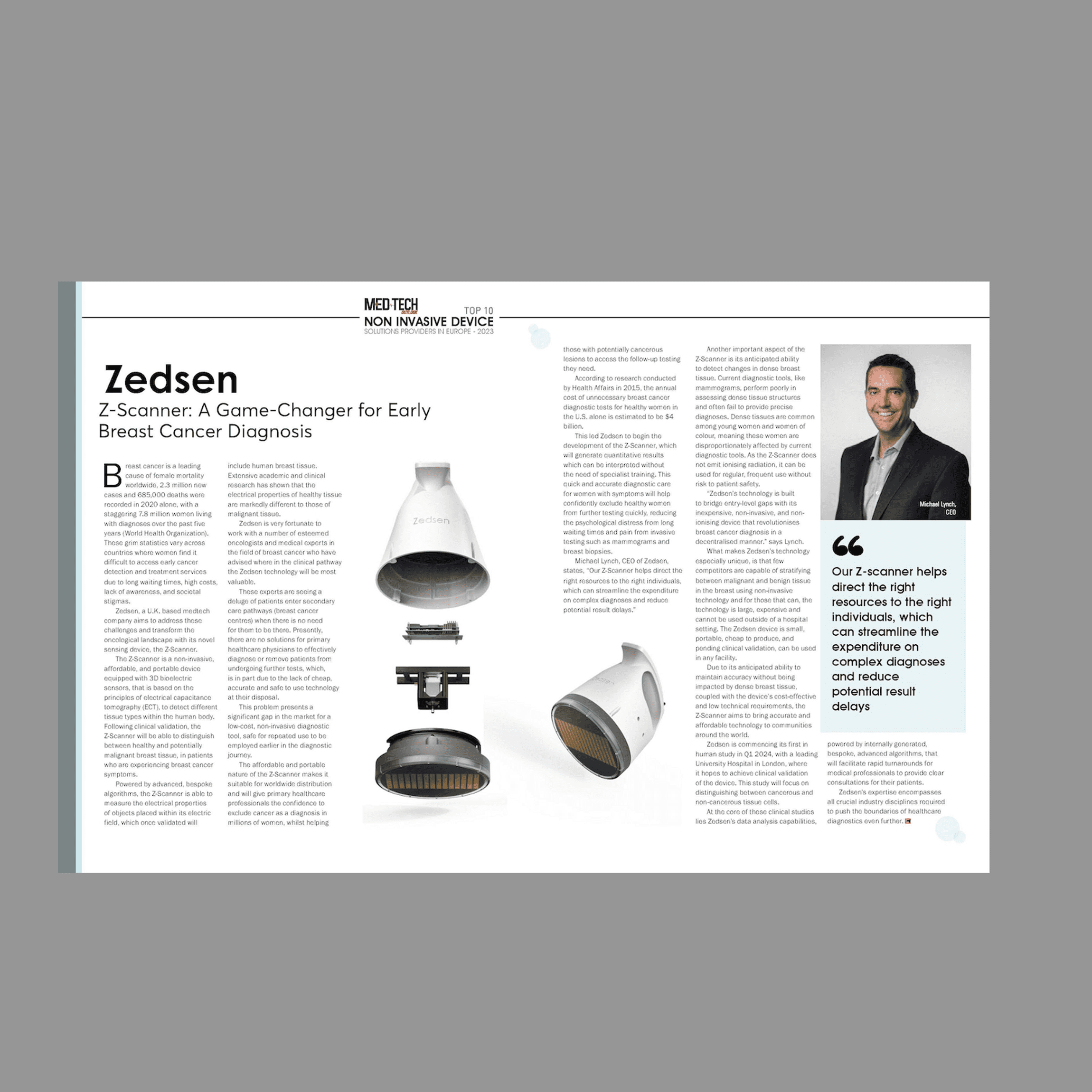
Z-Scanner: A Game-Changer for Early Breast Cancer Diagnosis
Posted on: 2 January 2024
Breast cancer is a leading cause of female mortality worldwide, 2.3 million new cases and 685,000 deaths were recorded in 2020 alone, with a staggering 7.8 million women living with diagnoses over the past five years (World Health Organization). These grim statistics vary across countries where women find it difficult to access early cancer detection and treatment services due to long waiting times, high costs, lack of awareness, and societal stigmas.
Zedsen, a U.K. based medtech company aims to address these challenges and transform the oncological landscape with its novel sensing device, the Z-Scanner.
The Z-Scanner is a non-invasive, affordable, and portable device equipped with 3D bioelectric sensors, that is based on the principles of electrical capacitance tomography (ECT), to detect different tissue types within the human body. Following clinical validation, the Z-Scanner will be able to distinguish between healthy and potentially malignant breast tissue, in patients who are experiencing breast cancer symptoms.
Powered by advanced, bespoke algorithms, the Z-Scanner is able to measure the electrical properties of objects placed within its electric field, which once validated will include human breast tissue. Extensive academic and clinical research has shown that the electrical properties of healthy tissue are markedly different to those of malignant tissue.
Zedsen is very fortunate to work with a number of esteemed oncologists and medical experts in the field of breast cancer who have advised where in the clinical pathway the Zedsen technology will be most valuable.
These experts are seeing a deluge of patients enter secondary care pathways (breast cancer centres) when there is no need for them to be there. Presently, there are no solutions for primary healthcare physicians to effectively diagnose or remove patients from undergoing further tests, which, is in part due to the lack of cheap, accurate and safe to use technology at their disposal.
This problem presents a significant gap in the market for a low-cost, non-invasive diagnostic tool, safe for repeated use to be employed earlier in the diagnostic journey.
The affordable and portable nature of the Z-Scanner makes it suitable for worldwide distribution and will give primary healthcare professionals the confidence to exclude cancer as a diagnosis in millions of women, whilst helping those with potentially cancerous lesions to access the follow-up testing they need.
According to research conducted by Health Affairs in 2015, the annual cost of unnecessary breast cancer diagnostic tests for healthy women in the U.S. alone is estimated to be $4 billion.
This led Zedsen to begin the development of the Z-Scanner, which will generate quantitative results which can be interpreted without the need of specialist training. This quick and accurate diagnostic care for women with symptoms will help confidently exclude healthy women from further testing quickly, reducing the psychological distress from long waiting times and pain from invasive testing such as mammograms and breast biopsies.
Michael Lynch, CEO of Zedsen, states, “Our Z-Scanner helps direct the right resources to the right individuals, which can streamline the expenditure on complex diagnoses and reduce potential result delays.”
Another important aspect of the Z-Scanner is its anticipated ability to detect changes in dense breast tissue. Current diagnostic tools, like mammograms, perform poorly in assessing dense tissue structures and often fail to provide precise diagnoses. Dense tissues are common among young women and women of colour, meaning these women are disproportionately affected by current diagnostic tools. As the Z-Scanner does not emit ionising radiation, it can be used for regular, frequent use without risk to patient safety.
“Zedsen’s technology is built to bridge entry-level gaps with its inexpensive, non-invasive, and non-ionising device that revolutionises breast cancer diagnosis in a decentralised manner.” says Lynch.
What makes Zedsen’s technology especially unique, is that few competitors are capable of stratifying between malignant and benign tissue in the breast using non-invasive technology and for those that can, the technology is large, expensive and cannot be used outside of a hospital setting. The Zedsen device is small, portable, cheap to produce, and pending clinical validation, can be used in any facility.
Due to its anticipated ability to maintain accuracy without being impacted by dense breast tissue, coupled with the device’s cost-effective and low technical requirements, the Z-Scanner aims to bring accurate and affordable technology to communities around the world.
Zedsen is commencing its first in human study in Q1 2024, with a leading University Hospital in London, where it hopes to achieve clinical validation of the device. This study will focus on distinguishing between cancerous and non-cancerous tissue cells.
At the core of these clinical studies lies Zedsen's data analysis capabilities, powered by internally generated, bespoke, advanced algorithms, that will facilitate rapid turnarounds for medical professionals to provide clear consultations for their patients.
Zedsen's expertise encompasses all crucial industry disciplines required to push the boundaries of healthcare diagnostics even further.